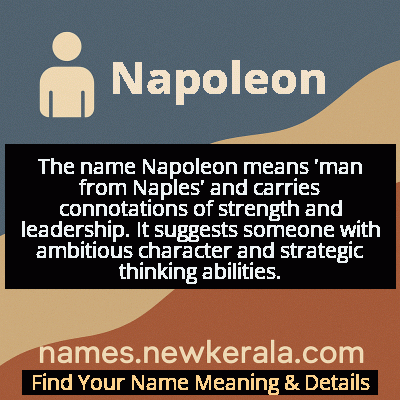Napoleon Name Meaning & Details
Origin, Popularity, Numerology Analysis & Name Meaning of Napoleon
Discover the origin, meaning, and cultural significance of the name NAPOLEON. Delve into its historical roots and explore the lasting impact it has had on communities and traditions.
Name
Napoleon
Gender
Male
Origin
French
Lucky Number
2
Meaning of the Name - Napoleon
The name Napoleon means 'man from Naples' and carries connotations of strength and leadership. It suggests someone with ambitious character and strategic thinking abilities.
Napoleon - Complete Numerology Analysis
Your Numerology Number
Based on Pythagorean Numerology System
Ruling Planet
Moon
Positive Nature
Diplomatic, friendly, artistic, empathetic.
Negative Traits
Over-sensitive, moody, indecisive, prone to self-pity.
Lucky Colours
Green, cream, white.
Lucky Days
Monday.
Lucky Stones
Pearl, moonstone.
Harmony Numbers
1, 3, 4.
Best Suited Professions
Diplomats, mediators, caregivers, artists.
What People Like About You
Cooperative spirit, friendliness, artistic talent.
Famous People Named Napoleon
Napoleon Bonaparte
Military leader and emperor
Emperor of France who reshaped European politics and warfare through his military campaigns and Napoleonic Code
Napoleon III
French emperor
Last monarch of France who modernized Paris and oversaw significant industrial development
Napoleon Lajoie
Professional baseball player
Hall of Fame second baseman and one of baseball's greatest hitters, American League batting champion
Napoleon Hill
Author and motivational speaker
Author of 'Think and Grow Rich,' one of the best-selling self-help books of all time
Name Variations & International Equivalents
Click on blue names to explore their detailed meanings. Gray names with will be available soon.
Cultural & Historical Significance
In art and literature, Napoleon became an archetype of the 'great man' who rises from humble origins to reshape history, inspiring countless works from Tolstoy's 'War and Peace' to contemporary films and television series. The name also carries complex political connotations, representing both revolutionary ideals and authoritarian rule, making it a subject of ongoing historical debate and cultural reinterpretation across different societies and time periods. This dual nature—both celebrated and controversial—ensures the name remains culturally relevant and symbolically rich in global consciousness.
Extended Personality Analysis
Individuals named Napoleon are often perceived as ambitious, strategic thinkers with strong leadership qualities and a determined, sometimes stubborn, nature. The name evokes associations with confidence, intelligence, and the ability to command respect, reflecting the historical figure's reputation for military brilliance and organizational skills. These individuals are typically seen as natural leaders who excel in challenging situations, possessing both the vision to see the big picture and the attention to detail necessary for execution.
However, the name also carries expectations of potential arrogance or overambition, suggesting someone who might push boundaries and take significant risks. The combination of 'Naples' (suggesting Mediterranean passion and warmth) with the implied strength of character creates a complex personality profile that balances strategic calculation with emotional intensity, making Napoleons often memorable and impactful figures in their personal and professional circles. This blend of intellectual prowess and determined character suggests individuals who are both thoughtful planners and decisive actors in their pursuits.
Modern Usage & Popularity
In contemporary times, the name Napoleon has become relatively rare as a given name, primarily due to the overwhelming association with the historical emperor. Modern usage tends to be selective, often chosen by parents with a particular interest in French history or those seeking a distinctive, powerful name with classical roots. The name appears more frequently in Latin American countries and certain European nations than in English-speaking countries, where it remains unconventional. Recent decades have seen some revival interest, particularly after cultural references like the film 'Napoleon Dynamite' introduced a more humorous, contemporary interpretation of the name. However, it consistently ranks outside the top 1000 names in most Western countries, maintaining its status as an unusual but historically significant choice that carries both the weight of its imperial legacy and potential for unique personal identity.
Symbolic & Spiritual Meanings
Symbolically, Napoleon represents ambition, leadership, and transformative power, embodying the archetype of the self-made individual who rises to greatness through intelligence and determination. The name carries connotations of military strategy, political revolution, and legal reform, symbolizing both the potential for human achievement and the dangers of unchecked ambition. In metaphorical terms, 'Napoleon' has become shorthand for any ambitious leader or dominant figure in various fields, from business to sports. The name also symbolizes the tension between individual genius and collective welfare, between revolutionary change and established order. In psychological terms, it represents the drive for legacy and immortality through achievement, while in cultural discourse, it serves as a reference point for discussions about leadership styles, the nature of power, and the complex relationship between personal ambition and historical impact.

